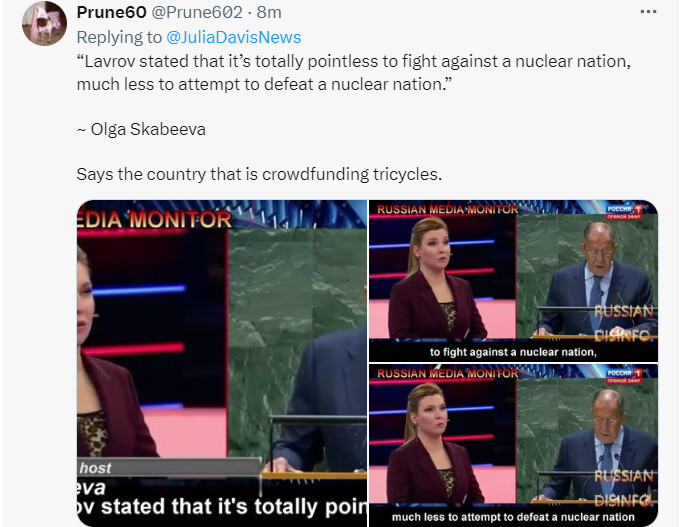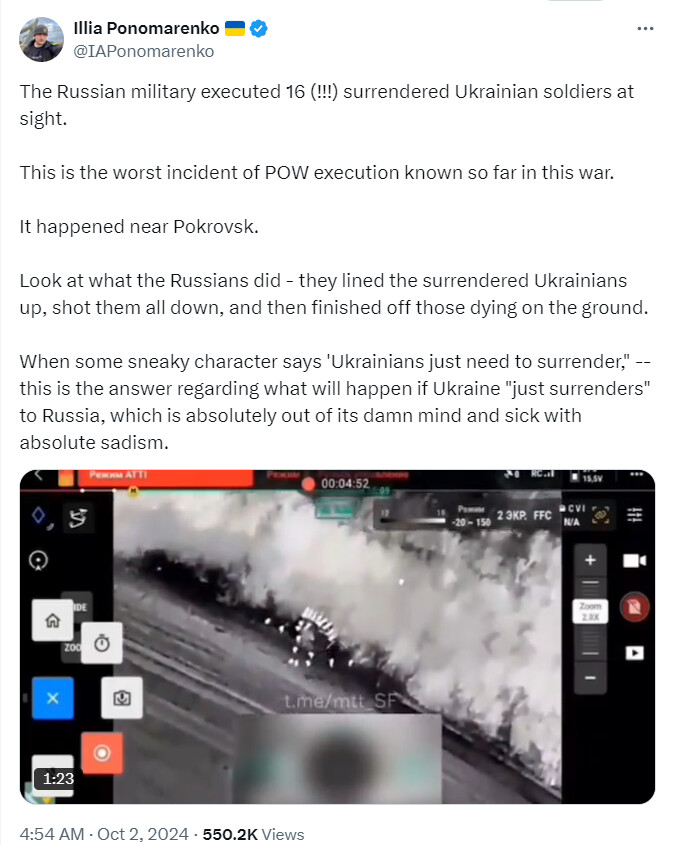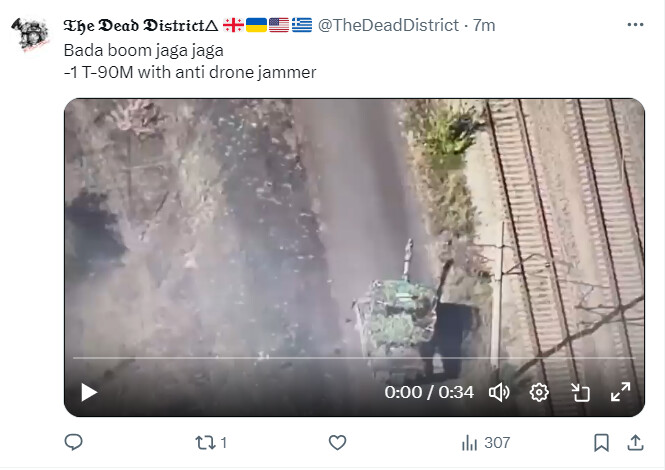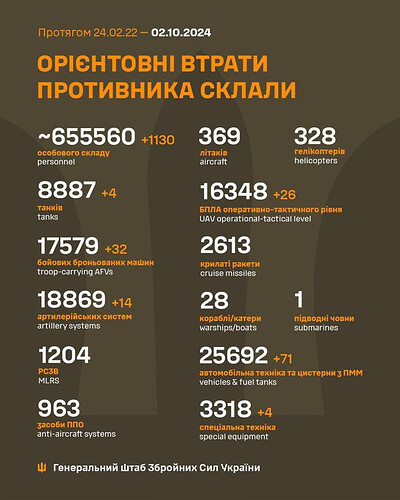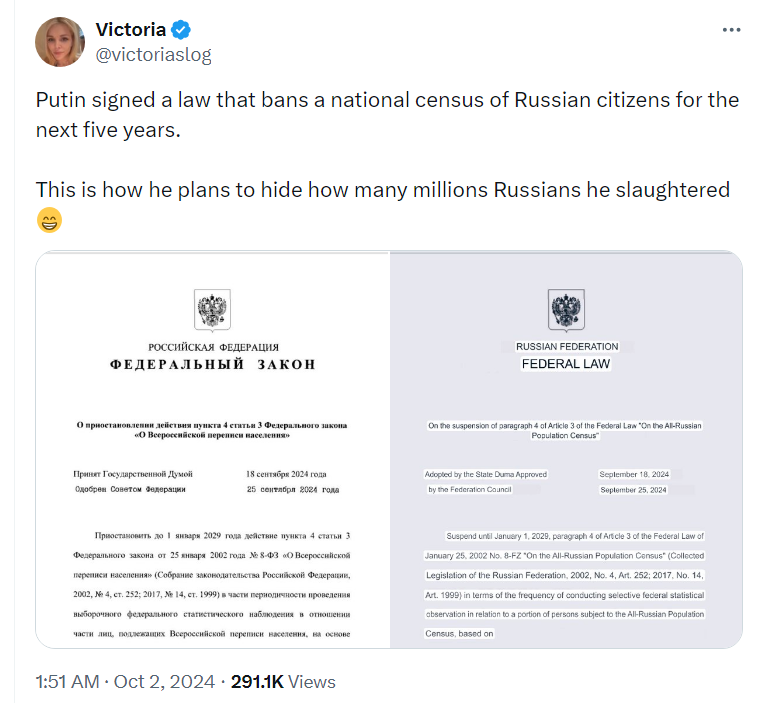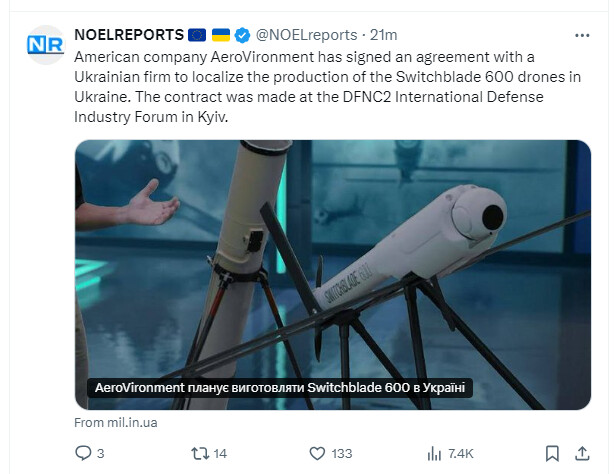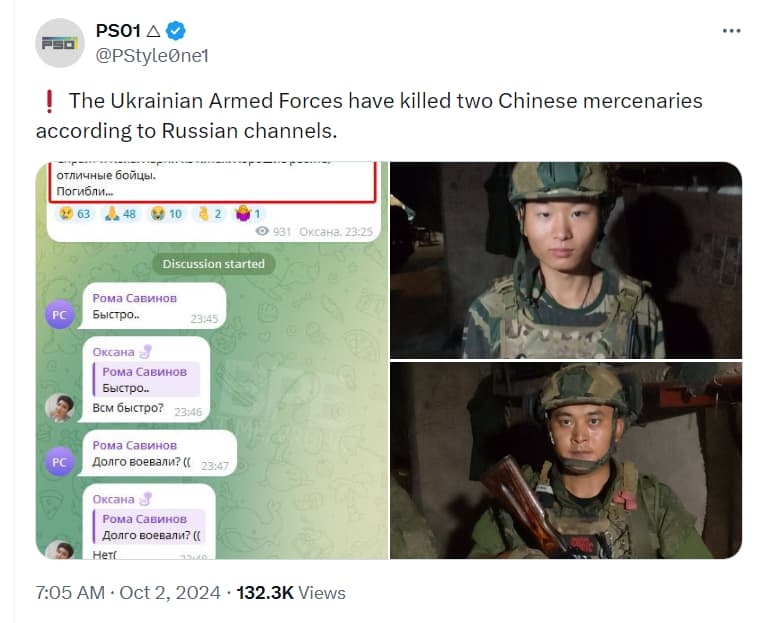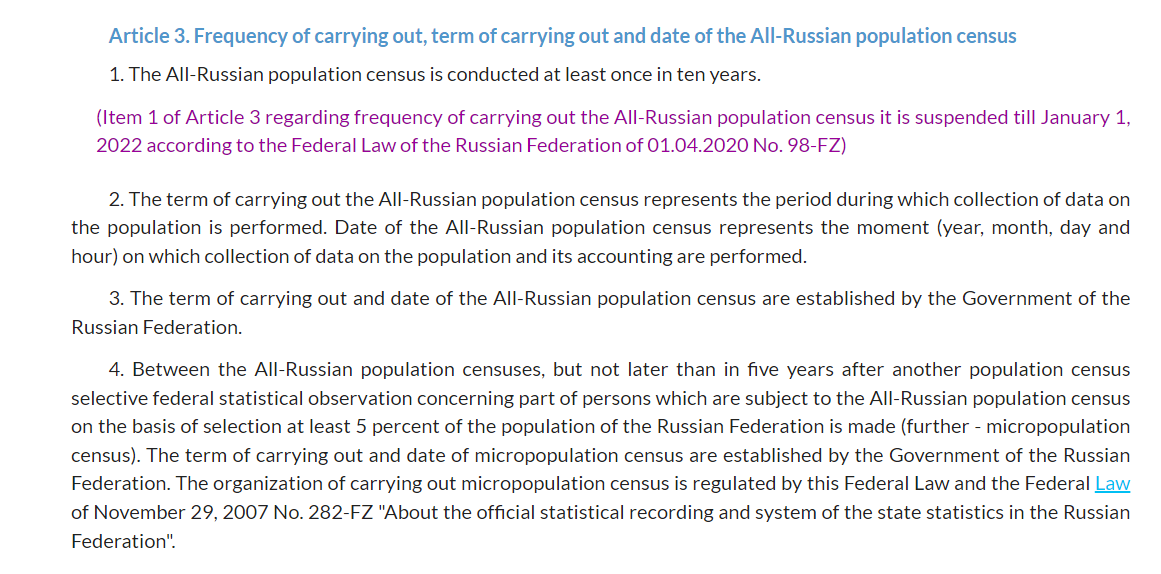Oh well
Thanks for posting BD but I can’t like it
Same.
Footage of Ukrainian FPVs doing anti drone intercepts.
Russian losses per 02/10/24 reported by the Ukrainian general staff
+1130 men
+4 tanks
+32 AFVs
+14 artillery pieces
+26 UAVs
We have been sponsoring the ADF drone racing team for years and they have been the world’s best 3 years running!
There’s 2 less arseholes that won’t be invading Taiwan
One thing that post proves: this world has fewer people than it has arseholes.
02 OCT 2024 9:54 PM AEST
UK: Russias Ukraine War Defining Our Generations Struggle
Thank you, Mr Chair. Last week Russia continued in its attempts to justify its illegal war of aggression against Ukraine. There can be no justifications for a war that Russia initiated, unprovoked. In doing so Russia attempted to mislead this Forum. By invading a sovereign state Russia has wilfully violated the Vienna Document and the Helsinki Final Act, foundation documents to which we are all signatories, and which underpin diplomacy here in this Forum.
The bravery and resilience of the Ukrainian people in defence of their homeland has been an inspiration. In pursuit of Ukraine’s inherent sovereign right to exist as an independent nation, they have unsurprisingly garnered support from around the world.
Compare this to the actions of the Russian military who, this weekend, conducted a ‘double-tap’ strike on the Saint Panteleimon Clinical Hospital in the Sumy Region, killing 10 people and injuring at least 22 others. most of those killed and wounded were first responders, hit 45 minutes after the first strike, as they attempted to evacuate those initially wounded. This is yet another violation of the Code of Conduct which obliges armed forms to comply with international law.
Two years, 226 days into this horrific conflict, the Russian state continues to issue threats in an effort to subjugate the Ukrainian people and deter others from providing such support. But the Russian state cannot be allowed to operate with impunity: its war in Ukraine is the defining struggle for our generation and profoundly challenges the UN Charter and the international order on which global prosperity and security depends.
The reality is that this war is proving costly to the Russian people. Military operations in Ukraine have cost Russia up to $211 billion. The militarisation of the economy is punishing the Russian people, with approximately 40% of the federal budget spent on Defence and security
Despite the appalling losses on both sides of the conflict, the Russian state presses on with little regard for the lives of its own soldiers. Russian air force personnel have been backfilling infantry roles due to the restricted Russian labour market. Russian fighting capability is depleted as it struggles to replace high casualty rates.
Russia can end this terrible war of choice immediately, by withdrawing its forces from Ukraine. The UK will continue to deliver £3 billion of military aid to Ukraine every year for as long as needed. The UK’s military, financial, diplomatic and political support for Ukraine is iron-clad - that includes backing calls for a Special Tribunal for the Crime of Aggression, to support efforts to hold Putin’s Russia to account for its illegal war.
The UK recognises that we must lay the foundations for Ukraine’s long-term future. We will accelerate Ukraine’s irreversible move towards NATO, while the Ukrainian people have decided their future is in Europe and the EU has opened accession talks. We are supporting private sector-led growth and reform unlocking obstacles to trade and investment. Doing more will not be without cost to us - but the costs of inaction are far higher.
Thank you.
/Public Release. This material from the originating organization/author(s) might be of the point-in-time nature, and edited for clarity, style and length. Mirage.News does not take institutional positions or sides, and all views, positions, and conclusions expressed herein are solely those of the author(s).View in full here.
https://www.miragenews.com/uk-russias-ukraine-war-defining-our-generations-1329069/
The fall of Vuhledar is a microcosm of Ukraine’s wartime predicament
Updated 9:49 PM AWST, October 2, 2024
KYIV, Ukraine (AP) — The fall of a front-line town nestled atop a tactically significant hill is unlikely to change the course of Ukraine’s war against Russia. But the loss underscores Kyiv’s worsening position, in part the result of firm Western red lines, military officials and analysts said.
Vuhledar, a town Ukrainian forces fought tooth and nail to keep for two years, is the latest urban settlement to fall to the Russians. It follows a vicious summer campaign along the eastern front that saw Kyiv cede several thousand square kilometers (miles) of territory.
Ukraine’s military said they were withdrawing their troops from Vuhledar to “protect the military personnel and equipment” in a statement on Wednesday.
Vuhledar’s fall is a microcosm of Ukraine’s predicament in this chapter of the nearly three-year war. It reflects the U.S.'s refusal to grant Ukraine permission to strike targets deep inside Russian territory, preventing Kyiv from degrading Moscow’s capabilities. Meanwhile, Russia’s dominance of the skies allows it to develop and advance devastating aerial glide bombs for which Ukraine has no effective response, while a controversial mobilization drive has failed to produce a new class of Ukrainian fighters capable of holding the line.
The Ukrainians’ retreat from the town comes after a much-anticipated visit by Ukrainian President Volodymyr Zelenskyy to the U.S. last week. The Biden administration so far has refused Kyiv’s request to use Army Tactical Missile Systems, or ATACMS, to strike Russian airfields and other key targets, and Zelenskyy’s “victory plan,” was dismissed by some as more of a wish list than a plan of action.
In the meantime, Russian fighter jets continued to drop aerial bombs on Vuhledar, which precipitated the retreat, soldiers there said.
“(The Russians’) main tactic was to encircle us from the flanks, and they did this constantly for six to seven months with constant aerial attacks — due to this tactic they managed to exhaust our resources, because we don’t have as much as they have,” said Arsenii Prylipka, the head of the press office of the 72nd Brigade, which had been defending Vuhledar since August 2022.
The fight for Vuhledar
After two years of failed attempts to capture Vuhledar, Russian forces switched tactics earlier this year. The town’s pre-war population of 14,000 dwindled to less than 100 during the heat of the fighting.
Russian soldiers began mounting sophisticated attacks from the north and southern flanks, powered by superior electronic warfare capabilities and an array of infantrymen on motorcycles, artillery fire, drones and aerial glide bombs. Moscow suffered heavy causalities.
Ukrainians have been pressuring the U.S. to relax restrictions on the use of Western weapons to strike targets deep inside Russia. Lawmakers said they expected a green light from the U.S. months ago, but it didn’t come: The Biden administration refused to waver on this red line.
It has meant that Russian command and control centers, logistics hubs and airfields from which Russian fighter jets carry deadly aerial glide bombs, are out of reach of Ukrainian forces.
Russia fires nearly 120 aerial bombs a day on average, about 3,000 a month. The bombs are Soviet-era weapons refitted with navigational technology.
“We cannot change the dynamics, and the Russians are pushing,” said Pavel Narozhnyi, founder of the non-profit Reactive Post, which sources spare parts for artillery.
Month after month of constant attacks eventually eroded Ukrainian defenses.
After two years of intense fighting, the 72nd Brigade — which never rotated out due to the intensity of the fight and the lack of a demobilization strategy from Ukrainian military leaders — withdrew from the patch of land many of their comrades died to defend.
Prylipka had said the brigade would stay until the very last moment when defending Vuhledar became impossible. That scenario unfolded this week.
“The Russians searched for weak spots in our defenses, a constant probe to find routes to penetrate the town and as they advanced they tried to destroy the entire town. All the time we are under fire,” said Prylipka.
Vuhledar served as a defensive stronghold, a fortress town atop a hill surrounded by open fields and near two major roads. From there, Ukrainian soldiers were able to observe approaching Russian forces at a distance. From that vantage point, it was easy to coordinate counter-attacks. That advantage now falls to Russian forces.
While tactically significant, Vuhledar isn’t a crucial logistics hub for Kyiv, and Russian forces already controlled most of the main roads through the town before capturing it, the U.S.-based Institute for the Study of War said. Ukraine’s access to other critical supply lines remains intact.
The road to Pokrovsk
The capture of Vuhledar is part of Moscow’s pursuit of the strategic logistics hub of Pokrovsk, just 30 kilometers (19 miles) north. Its fall would severely compromise Ukrainian defenses.
The next step for Russian forces will be to drive Ukrainian forces out of the nearby city of Kurakhove.
“This line is interconnected and the enemy will not be able to enter Pokrovsk and come close to Pokrovsk unless it can drive our troops out of Kurakhove,” said Ivan Tymochko, chairman of the Council of Reservists of Ukraine’s ground forces. “Otherwise, (the Russians) would have exposed their fronts to the flanks and would have received a serious blow to the side.”
“On the other hand, the enemy understands that if it does not take Kurakhove, it will not be able to seriously influence the course of events around Vuhledar,” he added.
https://apnews.com/article/ukraine-russia-war-vuhledar-2403780647659883a203feda35dd8ccc
Russia subjects Ukrainian POWs to rape, beatings and electric shocks – UN
WEDNESDAY, 2 OCTOBER 2024, 13:36
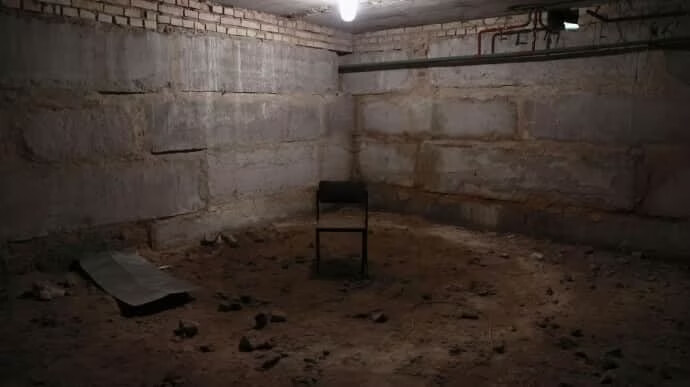
The Russian authorities regularly subject Ukrainian prisoners of war to torture and ill treatment at all stages of captivity.
Source: report by the Office of the United Nations High Commissioner for Human Rights (OHCHR)
Details: According to the report, the Russians systematically torture and abuse Ukrainian prisoners of war. 169 out of 174 interviewed POWs said such abuse was widespread during interrogations, transfer to detention facilities and daily internment procedures, according to OHCHR. Their testimonies were confirmed by other sources of information, the report says.
Torture includes beatings, electric shocks, sexual violence, suffocation, prolonged strenuous positions, forced physical exertion, sleep deprivation, mock executions and threats.
Quote: “The occupying authorities in Kherson repeatedly subjected a detained man to beatings, suffocation, waterboarding, electric shocks, including to genitals, and threats of castration after his apprehension in September 2022. They also raped the man anally with a metal object and simultaneously administered electric shocks to his ■■■■ and genitals.”
Details: The UN emphasises that many of the documented cases of torture or ill treatment involved employees of different state institutions, often indicating a significant level of coordination between them.
In addition, the report states that prison guards were aware of such treatment and could prevent it.
OHCHR also mentions public calls by Russian officials for the ill-treatment and execution of Ukrainian prisoners of war.
Background:
-
The UN’s Independent International Commission of Inquiry on Ukraine has uncovered new evidence of Russia’s torture of Ukrainian civilians and prisoners of war in the occupied territories. The findings indicate that Russian forces are operating in a coordinated manner across all torture chambers and regularly commit acts of sexual violence.
-
A Ukrainian told the media how the Russians held him captive for more than a year: in a Kherson torture chamber, in the temporarily occupied Crimea, and in a penal colony and detention centre in Russia. The Russians chained him up and stretched his body in the shape of a star, and the interrogation was accompanied by physical violence, threats and stun gun beatings.
-
On 17 September 2024, a Telegram channel published a post about the alleged execution of a Ukrainian defender by representatives of the Russian Armed Forces in the town of Novohrodivka. The published photos show that the Russians stabbed the Ukrainian soldier with a sword with the inscription reading For Kursk.
-
On 13 September 2024, Brenda J. Hollis, Head of Investigations into International Crimes Committed in Ukraine at the Office of the Prosecutor of the International Criminal Court (ICC), along with her team and members from the Ukrainian Prosecutor’s Office, inspected the torture chambers set up by the Russian military during the occupation of Kharkiv Oblast.
This is sourced from the fortieth periodic report on the Human Rights Situation in Ukraine - update on the human rights situation 1 June - 31 August 2024, by the Office of the UN Commissioner for Human Rights. The report is 29 pages in length .
The report covers the human rights evidence collected in the Ukraine and Russian occupied territories of Ukraine for civilians and Ukraine and Russian POWs, together with recommendations to Russia and Ukraine, based on UN Human Rights law. There are also recommendations to the international community
To note that, in addition to evidence of treatment of Ukraine POWs (as reported in the article) there is also evidence of treatment of Russian POWs. In regard to the Russian POWs, the report concluded that Russian POWs were subjected to torture or ill treatment by Ukraine during the initial stages of their captivity.
Is this unusual — is it a cancellation or an announcement? They don’t believe in regularly-spaced surveys there.
Yes, you’re correct, a full census is only done every decade. I looked up the law in question (FEDERAL LAW OF THE RUSSIAN FEDERATION of January 25, 2002 No. 8-FZ About the All-Russian population census) and it is Article 3 Paragraph 4 that has been suspended until 2029. Looks like the Duma have delayed the taking of a five-yearly “micro census”. Again, this could be to hide the negative effects of the war, or some conjecture points to preventing any count of the population of the newly legally annexed territories from being undertaken. It could also be a purely cost-cutting measure as census’ are expensive to organize and run and it was seen as superfluous while at war and the federal budget is being bled dry…
